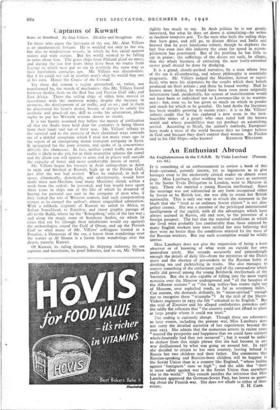Captains of Kuwait
Sons of Sindbad. By Alan Villiers. (Hodder and Stoughton. zos.)
To those who enjoy the literature of the sea, Mr. Alan Villiers is an anachronistic fortune. He is wedded not only to the sea, but also to wind-driven vessels, in which he has sailed narrow waters and wide oceans. But his world seemed to be falling in ruins about him. The grain ships from Finland plied no more,
and during the last few years there have been no routes from Europe in which men put to sea in precisely the same way as their forefathers centuries ago. Mr. Villiers was disconsolate. But if he could not sail in another man's ship he would buy one of his own. Hence the Cruise of the Conrad.
Yet there did remain a region untouched, or, rather, not transformed by, the march of mechanics : this Mr. Villiers found between Arabia, both on the Red Sea and Persian Gulf side, and East Africa. There the sailing ships of olden time moved in accordance with the monsoon winds, despite the increase in steamers, the development of air traffic, and so on ; and in them he discovered his heart's desire, beauty of design to satisfy his aesthetic and practised eye, skill to evoke his admiration, philo- sophy to put his Western notions almost to shame.
It is too hastily assumed that before the march of civilisation all that the Arabs have held dear for centuries is being blown from their lands and out of their seas. Mr. Villiers' tribute to the survival and to the exercise of their cherished ways reminds me of a doleful complaint which I read not many years ago in the report of an enterprising motor transport company in Syria.
It apologised for the poor returns, and spoke of la concurrence diloyale des chameaux. In fact, neither camel traffic nor dhow
traffic is likely to die yet, for in their respective spheres the camel and the dhow can still operate at costs and in places well outside the capacity of faster and more comfortable means of travel.
Mr. Villiers began his voyages in Arab sailing-ships at Aden in 1938, and finished at Kuwait, high up in the Persian Gulf, just after the war had started. What he endured, in lack of space, climatically, dietetically, and odoriferously, would have made most non-Muslims (and many Muslims) shrink within a week from the ordeal : he persisted, and fain would have spent three years in ships one of the like of which he dreamed of buying for personal use and in the company of men who, if they lacked the arts of Western seamen, had such compensating virtues as to compel the author's almost unqualified admiration. With a nahkoda (captain) of Kuwait he sailed to Africa, to Italian Somaliland, to Zanzibar, and (most graphic passage of all) to the Rufiji, where lay the ' Konigsberg,' relic of the last war ; and along the magic coast of Southern Arabia, on which lie cities that cry for (though their inhabitants would cry against) the archaeologist, round the Gulf of Oman, and up the Persian Gulf to what many of Mr. Villiers' colleagues treated as a Paradise, a Damascus of the sea, a haven from wanderings over the waters as Al Shams is a haven from wanderings over the desert, namely, Kuwait.
Of Kuwait, its ruling dynasty, its shipping industry, its sea captains and merchants, its pearl fisheries, and so on, Mr. Villiers
rightly has much to say. In Arab politics he is not greatly interested, but what he does set down is stimulating—he writes as laudator temporis acti. To the men who built the sailing ships that have gone, and still go, to distant Africa and India and beyond that he pays handsome tribute, though he deplores the fact that even into this industry the craze for speed in accom- plishment has penetrated. But of the pearling he has little to say in praise: the sufferings of the divers are such, he alleges, that the whole business of extracting the now lowly-esteemed oyster pearl should be done by dredging.
It is a grand, closely-packed narrative, by a man whose love of the sea is all-embracing, and whose philosophy is essentially pragmatic. Mr. Villiers judged the Muslims, devout or super- ficial, who were his shipmates by the results which their beliefs produced on their actions ; and these he found worthy. Had he known more Arabic, he would have been even more originally informative (and, incidentally, his system of transliteration would not have been so individual nor so Lawrence-like in its wanton- ness): but, even so, he has given us much on which to ponder and much for which to be grateful. On land Arabs the literature has been steadily growing in recent years: it is to Mr. Villiers' infinite credit that he has explored a new seam in the inex- haustible mines of a people who once ruled half the known world and whose possibilities may yet produce an astonishing revival. According to Nejdi, the author's nakhoda, Europeans have made a mess of the world because they no longer believe in God and because they don't control their women. As Flecker
said in his Old Ships—who knows? KENNETH WILLIAMS.


























 Previous page
Previous page